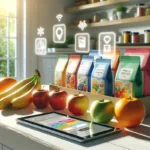Discover the best meat-free burgers for your summer grilling! Explore top vegan options perfect for your next BBQ and enjoy delicious plant-based flavors.
Enjoy vegan and vegetarian fine dining at The Manila Hotel – Manila Bulletin
Discover vegan and vegetarian fine dining at The Manila Hotel. Experience gourmet plant-based cuisine in a luxurious setting in Manila.
Artisan Bakery Pipp & Co Launches Its First Vegan Doughnut – vegconomist
Artisan bakery Pipp & Co debuts its first vegan doughnut, delighting plant-based food lovers with a delicious new treat for conscious consumers.
Nomo launches new vegan chocolate bar varieties – FoodBev Media
Nomo unveils exciting new vegan chocolate bar varieties! Discover the latest dairy-free treats making waves in the plant-based chocolate world.
Meet Zouk: Here’s Why Women Love Their Vegan Bags – HerZindagi
Discover why women are obsessed with Meet Zouk’s vegan bags—stylish, sustainable, and cruelty-free accessories for every occasion.
Travelling Abroad? Nutritionist Shares Diet For Vegetarians For Optimal Health – NDTV
Vegetarian traveler? Discover top nutritionist-approved diet tips for optimal health while traveling abroad. Stay fit and energized on your journey!
‘I Turned My Kitchen Into A Vegan Café For My Friends’ – Plant Based News
Discover how turning your kitchen into a vegan café can delight friends and inspire plant-based living. Explore easy vegan recipes and hosting tips!
Discover how an eatery’s quirky vegan menu expansion supports those with milk and egg allergies. Learn practical tips, Food Scan Genius, and expert advice.
A vibrant plate of colorful vegan dishes including grilled vegetables, plant-based patties, and a smartphone displaying the Food Scan Genius app interface.
Ham sandwiches centre of bus furore – Yahoo
Ham Sandwiches, Bus Furore, and Navigating Dietary Preferences with Food Scan Genius On April 15, a local bus campaign featuring images of ham sandwiches ignited controversy when several passengers reported that the ad was insensitive to those who observe religious diets/ dietary restrictions. The original Yahoo News report highlighted reactions from Muslim and Jewish communities, for whom pork is strictly prohibited. This incident underscores the growing importance of understanding diverse dietary preferences in public messaging, food marketing, and daily meal planning. From religious observances to food allergies, each individual’s eating pattern requires respect and clear communication. Enter Food Scan Genius, a groundbreaking app designed to help consumers instantly identify ingredients, allergens, and compliance with personal dietary choices. Key Takeaways The “ham sandwiches” bus ad sparked a debate on public sensitivity to dietary preferences. Religious dietary laws (halal, kosher) and food allergies demand clear labeling. Food Scan Genius uses barcode scanning and AI to verify ingredients against personal profiles. Medical authorities (CDC, Mayo Clinic, NIH) emphasize the health impact of dietary compliance. Apps and community resources empower individuals to navigate complex food landscapes. Background: Religious and Ethical Dietary Preferences Dietary preferences encompass a wide spectrum—from religious laws to ethical choices. In Islam and Judaism, consuming pork is strictly forbidden. Many Hindus avoid beef, while Buddhists and Jains embrace vegetarianism or veganism. Ethical vegetarians reject meat for animal welfare, and flexitarians reduce meat for environmental concerns. Public spaces like buses, schools, and cafeterias increasingly feature food imagery. Without thoughtful curation, such displays can inadvertently alienate specific groups. The recent bus furore in the UK highlights why marketers and public services must consider the beliefs and values of all passengers. Halal and kosher certification involves stringent processes. Halal slaughter adheres to Islamic law, while kosher slaughter follows Jewish shechita rules. Certification logos guide consumers in supermarkets. However, non-Muslims and non-Jews may be unaware of these symbols, underscoring a broader need for education. Apps such as Food Scan Genius can bridge information gaps. By scanning barcodes, users receive instant feedback on whether a product meets halal, kosher, vegan, or allergen-free criteria. This technological support fosters confidence and inclusion. Medical and Scientific Perspective Understanding the science behind dietary restrictions can improve health outcomes. For instance, pork is high in saturated fat, which the CDC links to cardiovascular disease risk. Processed pork products often contain nitrites, which the NIH associates with increased cancer risk. Conversely, many halal and kosher guidelines parallel general food safety principles—emphasizing cleanliness, humane slaughter, and thorough cooking. The Mayo Clinic notes that stringent food-handling rules lower microbial contamination. Food allergies and intolerances further complicate dietary choices. According to the Food Allergy Research & Education (FARE), 32 million Americans live with food allergies. Cross-contact with pork-based products can trigger severe reactions in sensitive individuals. Implementing tech solutions like Food Scan Genius supports medical accuracy. The app’s database consolidates peer-reviewed nutrition data and clinical guidelines. Users can filter by nutrient thresholds—sodium, sugar, saturated fat—aligning meals with health objectives. Table: Dietary Restrictions by Religion and Ethics Group Prohibited Foods Allowed Alternatives Certification Logos Muslims Pork, alcohol Beef, poultry; halal-certified Halal (H inside crescent) Jews Pork, shellfish, mixing milk & meat Beef, poultry; kosher-certified Kof-K, OU Hindus Beef (often), many avoid all meat Vegetarian; dairy, legumes Vegetarian mark (green dot) Vegetarians/Vegans Meat (dairy for vegans) Plant-based proteins Vegan logo, “Plant Based” Impact on Individuals with Dietary Preferences Public campaigns that overlook specific dietary restrictions can cause social friction. The bus ad example created feelings of exclusion among observant Muslims and Jews. Small daily interactions—cafeteria menus, office lunches, or advertising—shape a person’s sense of belonging. Dietary compliance also affects mental health. A 2022 study in the Journal of Nutrition Education found that food-related social stress increases anxiety and decreases overall life satisfaction. When people struggle to find safe, acceptable options, they may skip meals or avoid social gatherings. Inclusive practices enhance well-being. Schools that label pork-free options, offices that accommodate vegan lunches, and restaurants that highlight halal or kosher certifications foster community cohesion. Tools like Food Scan Genius empower customers to make informed choices discreetly. Moreover, clear labeling reduces the risk of accidental exposures. The CDC stresses that foodborne illnesses can be severe in immunocompromised individuals. Apps that cross-reference clinical guidelines against product ingredients help prevent such incidents. Practical Advice for Managing Dietary Preferences Educate Yourself: Learn common certification symbols (halal, kosher, vegan). Use Technology: Download Food Scan Genius to scan barcodes in real time. Plan Meals: Create weekly menus and shopping lists focused on compliant products. Communicate Needs: Inform friends, colleagues, and hosts about your preferences. Check Menus Online: Look for allergen and dietary filters on restaurant websites. Read Labels: Avoid ambiguous terms like “natural flavor” without clarification. When shopping, organize your pantry by clearance date and preference. Consider meal-prep services that offer tagged dietary profiles. Always carry a list of emergency contacts and local resources for dietary accommodation. Related Research and Developments Research on plant-based proteins continues to expand. A 2023 report from the NIH highlights innovations in lab-grown meat that mimic pork’s texture and flavor. Such alternatives cater to consumers seeking halal, kosher, or flexitarian options. Food-tech startups are integrating blockchain to ensure supply-chain transparency. Products bearing verifiable QR codes trace each ingredient’s origin, improving trust in certifications. These solutions dovetail with apps like Food Scan Genius for seamless consumer experiences. On the academic front, nutritionists are exploring personalized dietary algorithms. By analyzing genetic markers and microbiome data, future apps may recommend not only permissible foods but also optimize for metabolic health, reducing chronic disease risk. Meanwhile, global festivals and culinary events increasingly feature multi-faith and allergy-friendly menus. These initiatives promote cultural exchange and demonstrate how food can unite diverse populations. Resources and Support Options CDC Heart Disease Prevention Mayo Clinic on Food Allergies Food Allergy Research & Education (FARE) National Institutes of Health (NIH) Food Scan Genius Official Site Frequently Asked Questions Which religions prohibit eating pork? Islam and Judaism strictly forbid pork consumption. Some Christian denominations and other faiths may avoid
USDA issues voluntary recall of Trader Joe’s salad product due to undeclared milk allergen – Northern Kentucky Tribune
USDA Voluntary Recall of Trader Joe’s Salad Due to Undeclared Milk Allergen According to the Northern Kentucky Tribune, the USDA has issued a voluntary recall of a Trader Joe’s salad product after discovering undeclared milk on the label. This Trader Joe’s salad recall affects individuals with milk allergies and underscores the importance of accurate labeling. Introduction Food allergies affect up to 8% of children and 4% of adults in the U.S., according to the CDC. Undeclared allergens can trigger severe reactions, including anaphylaxis. In early June 2024, Trader Joe’s initiated a voluntary recall for its “Harvest Salad Kit” due to undeclared milk ingredients. While no illnesses have been reported so far, the recall aims to protect consumers with dairy intolerance and allergies. This blog post offers a comprehensive overview of the Trader Joe’s salad recall, details on milk allergens, medical insights, practical management tips, and the role of tools like Food Scan Genius in preventing accidental exposure. Stay informed and empowered to keep yourself and loved ones safe. Key Takeaways The USDA recall affects Trader Joe’s Harvest Salad Kit due to undeclared milk. Milk allergies can cause severe reactions; immediate action is vital. Use scanning apps like Food Scan Genius to detect hidden allergens. Consult authoritative sources: Mayo Clinic, FARE. Report symptoms and seek medical help if exposed. Background Context on Milk Allergies and Trader Joe’s Salad Recall Milk allergy, one of the most common food allergies in children, involves an immune response to milk proteins such as casein and whey. Symptoms range from hives and digestive distress to life-threatening anaphylaxis. The USDA voluntary recall, announced on June 5, 2024, covers Trader Joe’s Harvest Salad Kit with the following details: Recall Details for Trader Joe’s Harvest Salad Kit Product Size Lot Code Undeclared Allergen Best By Date Harvest Salad Kit 12 oz (340 g) Lot 12345 Milk 06/15/2024 Trader Joe’s communicated the recall via its website and in-store notices, urging customers to stop consumption and return the product for a full refund. Understanding labeling laws and allergen statements is crucial. The Food Allergen Labeling and Consumer Protection Act (FALCPA) mandates clear disclosure of the “Big Eight” allergens, including milk. This recall highlights potential gaps in quality control. Medical and Scientific Explanation Milk allergy results from the immune system mistaking milk proteins for harmful invaders. Upon exposure, immunoglobulin E (IgE) antibodies trigger the release of histamine and other mediators. Common Symptoms of Milk Allergy Skin reactions: hives, eczema Gastrointestinal issues: nausea, vomiting, diarrhea Respiratory problems: wheezing, nasal congestion Anaphylaxis: may include throat swelling, difficulty breathing, drop in blood pressure Studies show that approximately 80% of children outgrow milk allergy by age 16, but adults can develop persistent allergies. For the latest research on immunotherapy and desensitization, refer to the NIH. Diagnosis and Testing Skin Prick Test: Small allergen extracts are introduced under the skin. Blood Test (Specific IgE): Measures IgE antibodies to milk proteins. Oral Food Challenge: Conducted under medical supervision. Early and accurate diagnosis, guided by a board-certified allergist, is vital to prevent accidental exposures such as the Trader Joe’s salad recall. Impact on Individuals with Food Allergies Food allergy recalls like the Trader Joe’s salad recall can provoke anxiety and disrupt daily routines. For many families, school lunches and office meals rely on trust in labels. Key impacts include: Emotional stress: fear of unknown ingredients Financial burden: wasted food and medical costs Social limitations: avoiding shared meals In a survey by FARE, 72% of respondents reported anxiety about dining out or eating pre-packaged foods. The Trader Joe’s incident underscores the need for vigilance and reliable information. Using tools like Food Scan Genius, which scans barcodes and ingredients lists to flag allergens, can reduce the risk of accidental ingestion and restore consumer confidence. Practical Advice for Managing Milk Allergy Managing milk allergies involves careful label reading, meal planning, and emergency preparedness. Below are actionable steps to navigate the Trader Joe’s salad recall and beyond. 1. Check and Cross-Check Labels Always read ingredient lists and allergen statements. Confirm recall lot codes on the USDA website or Trader Joe’s recall page. Use Food Scan Genius to verify products in real time. 2. Stock Allergen-Free Alternatives Opt for certified dairy-free salad kits. Prepare homemade salads with known ingredients. Label leftovers clearly to avoid mix-ups. 3. Prepare for Emergencies Carry two epinephrine auto-injectors per FDA guidelines. Wear medical identification jewelry naming “milk allergy.” Educate friends, family, and caretakers on emergency protocols. 4. Consult Healthcare Professionals Regular follow-ups with an allergist. Discuss oral immunotherapy (OIT) trials if eligible. Access reliable resources: FARE, Mayo Clinic. Related Food Allergy Research and Developments Innovations in food allergy treatment and detection offer hope for those affected by milk and other allergens. 1. Oral Immunotherapy (OIT) OIT involves gradually increasing exposure to allergens under medical supervision to build tolerance. A recent NIH-funded trial reported promising results for milk desensitization. 2. Epicutaneous Immunotherapy Patch-based therapy introduces allergens through the skin, stimulating immune tolerance with fewer side effects. 3. Advanced Allergen Detection Apps like Food Scan Genius now integrate AI to analyze ingredients lists and cross-reference recall databases in seconds. 4. Novel Therapies Biologic drugs targeting molecular pathways aim to reduce severe reactions. Ongoing clinical trials may expand options for milk-allergic individuals. Resources and Support Options Food Allergy Research & Education (FARE) – Education, support communities CDC Food Allergies – Guidelines, statistics Mayo Clinic – Clinical information FDA Food Safety Education – Labeling regulations Frequently Asked Questions What products are included in the Trader Joe’s salad recall? The recall covers the 12 oz Harvest Salad Kit, Lot Code 12345, Best By 06/15/2024, due to undeclared milk. What should I do if I have a milk allergy and purchased this salad? Discard the product or return it to any Trader Joe’s for a full refund. Contact your healthcare provider if you experience symptoms. How can I stay informed about future recalls? Sign up for USDA and FDA recall notifications, and use apps like Food Scan Genius for real-time alerts. Can I outgrow













